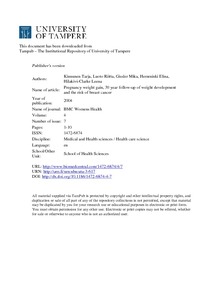Pregnancy weight gain, 30 year follow-up of weight development and the risk of breast cancer
Kinnunen, Tarja; Luoto, Riitta; Gissler, Mika; Hemminki, Elina; Hilakivi-Clarke, Leena (2004)
Kinnunen, Tarja
Luoto, Riitta
Gissler, Mika
Hemminki, Elina
Hilakivi-Clarke, Leena
2004
BMC Womens Health 4
7
This publication is copyrighted. You may download, display and print it for Your own personal use. Commercial use is prohibited.
Julkaisun pysyvä osoite on
https://urn.fi/urn:nbn:uta-3-617
https://urn.fi/urn:nbn:uta-3-617
Kuvaus
BioMed Central open access
Tiivistelmä
Background
Elevated pregnancy estrogen levels are associated with increased risk of developing breast cancer in mothers. We studied whether pregnancy weight gain that has been linked to high circulating estrogen levels, affects a mother's breast cancer risk.
Methods
Our cohort consisted of women who were pregnant between 1954–1963 in Helsinki, Finland, 2,089 of which were eligible for the study. Pregnancy data were collected from patient records of maternity centers. 123 subsequent breast cancer cases were identified through a record linkage to the Finnish Cancer Registry, and the mean age at diagnosis was 56 years (range 35 – 74). A sample of 979 women (123 cases, 856 controls) from the cohort was linked to the Hospital Inpatient Registry to obtain information on the women's stay in hospitals.
Results
Mothers in the upper tertile of pregnancy weight gain (>15 kg) had a 1.62-fold (95% CI 1.03–2.53) higher breast cancer risk than mothers who gained the recommended amount (the middle tertile, mean: 12.9 kg, range 11–15 kg), after adjusting for mother's age at menarche, age at first birth, age at index pregnancy, parity at the index birth, and body mass index (BMI) before the index pregnancy. In a separate nested case-control study (n = 65 cases and 431 controls), adjustment for BMI at the time of breast cancer diagnosis did not modify the findings.
Conclusions
Our study suggests that high pregnancy weight gain increases later breast cancer risk, independently from body weight at the time of diagnosis.
Elevated pregnancy estrogen levels are associated with increased risk of developing breast cancer in mothers. We studied whether pregnancy weight gain that has been linked to high circulating estrogen levels, affects a mother's breast cancer risk.
Methods
Our cohort consisted of women who were pregnant between 1954–1963 in Helsinki, Finland, 2,089 of which were eligible for the study. Pregnancy data were collected from patient records of maternity centers. 123 subsequent breast cancer cases were identified through a record linkage to the Finnish Cancer Registry, and the mean age at diagnosis was 56 years (range 35 – 74). A sample of 979 women (123 cases, 856 controls) from the cohort was linked to the Hospital Inpatient Registry to obtain information on the women's stay in hospitals.
Results
Mothers in the upper tertile of pregnancy weight gain (>15 kg) had a 1.62-fold (95% CI 1.03–2.53) higher breast cancer risk than mothers who gained the recommended amount (the middle tertile, mean: 12.9 kg, range 11–15 kg), after adjusting for mother's age at menarche, age at first birth, age at index pregnancy, parity at the index birth, and body mass index (BMI) before the index pregnancy. In a separate nested case-control study (n = 65 cases and 431 controls), adjustment for BMI at the time of breast cancer diagnosis did not modify the findings.
Conclusions
Our study suggests that high pregnancy weight gain increases later breast cancer risk, independently from body weight at the time of diagnosis.
Kokoelmat
- Artikkelit [6140]
